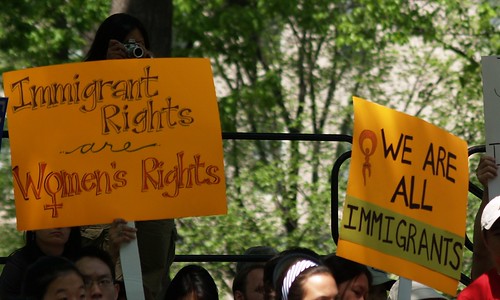Can I Get A May Day for Immigrant Women’s Health?
May Day has become a day to publicly recognize and stand up for the rights of immigrants in the United States. But the reproductive health of immigrant women must be included in this message.
May Day, May 1st, has come to hold the promise of rallies for immigrant rights staged across the United States. And this year is no different. But with McCain's more-of-the-same health care plan having just been released, it's a perfect time to focus on why women's reproductive health care must be a crucial part of any discussion about immigration reform.
Immigration reform must be a priority for our incoming president but we need more than just proposals. In Washington, DC, today, protesters are delivering letters to both the RNC and DNC asking the presidential candidates to enact legislation reform around immigration issues.
And while fundamentalist, anti-choice advocacy organizations like Concerned Women for America and Focus on the Family have traditionally taken a hard-line anti-immigration stance, there has been little vocal opposition to today's marches around the country.
It's time for unity and an expression of humanity when it comes to immigrant rights. It's time to remember where we all came from. It is a source of amazement to me that anti-choice advocates can use the following quote from Pope John Paul II as an excuse to stomp on the reproductive rights of women, "A society will be judged on the basis of how it treats its weakest members and among the most vulnerable are surely the unborn and the dying" without acknowledging the vulnerability of those seeking a new and better life in the United States and the ways in which the policies we enact or fail to enact have a deep and lasting impact on an entire family's lives.
As Rewire has reported, immigrant women – both documented and undocumented – have been unfairly targeted in this country by lawmakers and anti-immigrant groups.
Conservative lawmakers and anti-immigration groups have focused in particular on the fertility of immigrant women of color placing an almost unbelievable burden on immigrant mothers. Last year, the Center for Immigration Studies released the results of a study entitled, "Illegitimate Nation: An Examination of Out-of-Wedlock Births Among Immigrants and Natives", which Priscilla Huang debunks bit by bit on Rewire. But the larger issues around racism and opposition to women's reproductive autonomy are still present within the immigration debate.
Huang writes, "Groups like FAIR [ed. Note: Federation for American Immigration Reform] assert that immigrant women enter the U.S. to give birth to "anchor babies," who can then sponsor the immigration of other relatives upon reaching the age of 21. They further contend that "anchor babies" and their families create a drain on the country's social service programs. The irrational stance of anti-immigrant advocates echoes that of 1990's welfare reformers. Both assume that childbearing by immigrants or poor women of color creates a cycle of poverty and dependence on the government. Immigrant women and women on welfare are depicted as irresponsible mothers and fraudulent freeloaders."
This is one of the reasons why The National Latina Institute for Reproductive Health (NLIRH) prioritizes immigrant women's reproductive health in any and all immigration reform discussions. Recognizing that the majority of immigrant women do not have access to health care in this country and, in fact, regressive state laws have been introduced as of late that seek to deny basic health services to women (including prenatal care), NLIRH is on the front lines with a broad-based coalition working to prioritize reproductive justice.
Immigration is a feminist issue, a reproductive justice issue and a human rights issue. Spring represents rebirth, renewal and fecundity so this May Day let's make sure reproductive health remains a central part of the plan to reform our immigration policies.
